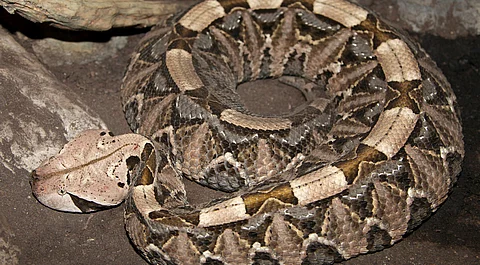

Imagine this: A farmer somewhere in Africa’s vast Congo Basin is working in his fields. As he clears a stash of leaf litter, he suddenly feels a searing pain in his leg. Clutching his leg, he cries out. Others in the field rush to him, only to see a tail disappearing into the undergrowth: It is one of Africa’s deadly snakes. The Gaboon Viper has longer fangs than any other snake species.
Across the Atlantic, a man in a village near a forest in Honduras returns home, tired from the day’s work. As he is settling down for the night, he suddenly feels intense pain in his arm. Before passing out, he recognises the cause of the pain: the fer-de-lance, one of the New World’s most venomous snakes.
One can imagine the aftermath of these two incidents. Latin America and Sub-Saharan Africa, like South Asia which includes India, are developing regions of the world. Like in India, many people bitten by snakes are often poor, marginalised or live in remote areas, often miles away from the nearest town or city. Getting timely help for snakebite victims in the form of anti-venom is often difficult, given these constraints. With the result that most victims die before they can be administered anti-venom.
No wonder then that the United Nations classifies snakebite as a Neglected Tropical Disease (NTD). “An ongoing crisis restricting access to safe, effective anti-venom treatment in many regions, and particularly sub-Saharan Africa, is one factor that contributes to the predisposition for seeking help through traditional medicine,” the World Health Organization (WHO) notes on its website.
Now imagine this: In the above two situations, after being bitten, suppose the two individuals swallow one or a number of pills. Soon, the effects of the snake bite disappear. This gives both victims valuable time to reach the nearest hospital to consult a medical professional.
Impossible, one would say. But this is what scientists hope will be reality one day and no fiction.
Scientist worldwide are working to make pills against snake bite a reality. One such initiative has been taken by the Centre for Snakebite Research & Interventions (CSRI) in Liverpool, United Kingdom.
In a blogpost on its website this year, CSRI noted that one of its research areas of interest has been in the development of new small molecule-based snakebite therapies that could be taken orally and that are significantly cheaper to produce than currently used anti-venoms.
It added that anti-venoms are expensive biologic therapies to produce, can induce severe adverse events, and must be injected by a clinical healthcare professional.
“This means that a snakebite victim must reach their nearest healthcare centre to receive lifesaving anti-venom; a journey that can take hours or even days in certain parts of rural Africa in a situation where minutes matter. In addition, small clinics in particularly remote communities often do not even have the proper anti-venom available, meaning there is little the healthcare workers can do to help the victim,” CSRI said.
If an orally active small molecule-based snakebite treatment existed as a tablet, it could be kept in any rural village or home in case of an emergency. This tablet could be taken within minutes of a snakebite occurrence, buying the victim precious time to get to hospital for anti-venom and potentially saving their life, it added.
CSRI’s scientists wrote a paper on trying to repurpose DMPS (full chemical name: 2,3-dimercapto-1-proanesulfonic acid; trade name: Dimaval) as a possible treatment for snakebite.
The scientists tested DMPS in the form of pills with mice. They found that when mice bitten by saw-scaled vipers — a species notorious in India for the number of human deaths it causes each year — were given DMPS orally, 15 minutes after ‘envenomation’, the survival rate was 100 per cent. In another scenario, the mice also survived after being administered anti-venom an hour after being bitten.
However, 15 minutes versus an hour can make all the difference.
Evolutionary biologist and Associate Professor, Kartik Sunagar, who heads the Evolutionary Venomics Lab at the Indian Institute of Science in Bengaluru, feels that pills for preventing death due to snake bite is surely not in the realm of sci-fi but is very much possible.
Sunagar should know. He is working on something similar for snakes in India. The pills are essentially a repurposing of drugs already available, according to him. However, he adds a caveat about venom variation.
“Even the same snake species can have distinct venom types based on the locality it inhabits. For different species of snakes, the pill or combination of pills could be different. All of this needs to be rigorously tested before taking them forward to clinical trials,” Sunagar told Down To Earth (DTE).
According to WHO, 4.5-5.4 million people get bitten by snakes annually. Of this, 1.8-2.7 million develop clinical illness and 81,000 to 138,000 die from complications.
If Sunagar and the scientists at CSRI can succeed in their efforts, a deadly scourge, one that has caused grief to humans since our own advent on the planet, can be done away with, without causing harm to snakes.